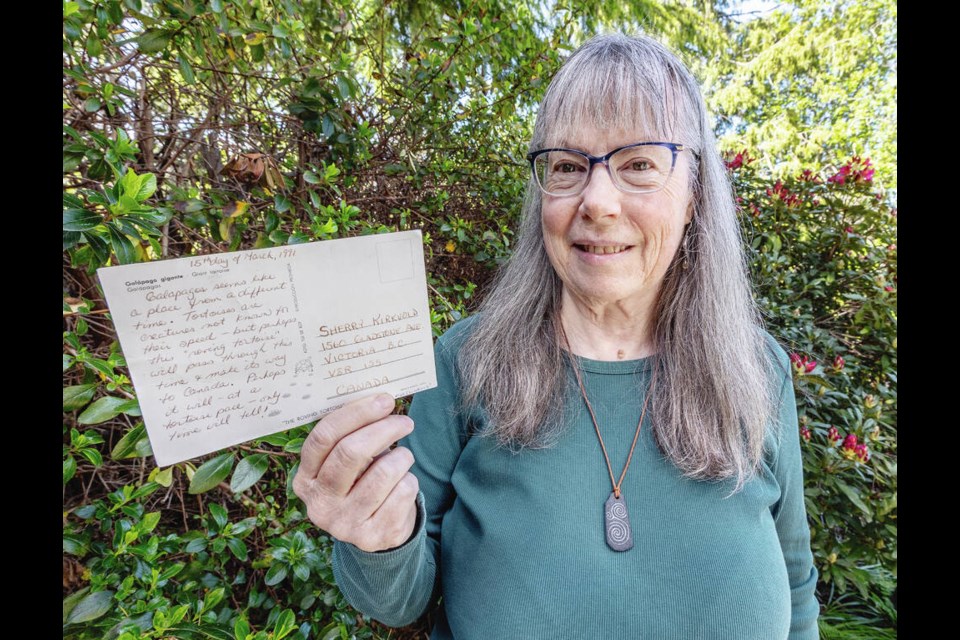The postcard that Sherry Kirkvold sent herself from the Galapagos Islands finally arrived — 33 years and one month after she dropped it into a whale-oil-barrel post box.
The postcard turned out to be prophetic — on the front was a giant tortoise, which obviously set the pace for delivery.
“I was very surprised and sort of gave up hope I’d ever receive it,” the Esquimalt resident, a life-long naturalist and guide, said this week.
There are no postal services on Floreana Island in the Galapagos Archipelago, but at Post Office Bay, visitors can drop off postcards and letters in old barrels.
The idea is that other visitors who are heading home and live close to the senders can pick them up, carrying on a centuries-old tradition of hand-delivering the cards and sharing stories.
The visitor who took Kirkvold’s postcard was Susan Fanning of Strathmore, Alta. Fanning, who was on a trip to the Galapagos Islands with her physician husband, Ward Fanning, found the postcard just a few weeks after Kirkvold dropped it at Post Office Bay on March 15, 1991.
Fanning happened to have a brother-in-law living in Victoria, so on a visit to the capital region after the 1991 trip, Fanning dropped by Kirkvold’s Gladstone Avenue home to deliver the postcard.
The problem was that Kirkvold had recently moved. The home’s new occupant sent her to a new address, but Kirkvold wasn’t home there, either.
The trail for Kirkvold went cold after that. Fanning put the card in a china-cabinet drawer, pulling it out occasionally to start sleuthing, but with Internet searches in their infancy, there wasn’t an easy way to find Kirkvold.
Life continued and time passed. The Fannings had four children, and their small-town medical practice got busy.
But earlier this year, on a chance Google search, Fanning found a phone number for Kirkvold.
She called the number and, eureka, her Galapagos connection came full circle. She mailed the postcard right away and the two enjoyed a phone conversation about their travels over the years, including their close encounter on Floreana Island.
“Sherry was so excited and so was I,” said Fanning. “It was just so fun to finally make the connection. It’s a beautiful thing.”
Kirkvold returned to the Galapagos Islands again in 1997, but didn’t make it to Floreana, although she has travelled extensively since, including to South America.
Over the years, she has held various jobs in the touring industry, including aboard the Maple Leaf sailing ship to the Great Bear Rainforest, Blue Water Adventures to Alaska and in the Kananaskis Country near Canmore, Alta., where the Fannings have spent many summers with their family.
Both women hope to see each other in future, after bonding over their shared love of travel and eco-tourism.
“It’s an old connection and [now] a warm friendship,” said Fanning.
When she picked up Kirkvold’s postcard back in 1991, Fanning, who was then seven months pregnant with their first daughter, Haley, dropped off her own postcard to her unborn daughter. It was mailed to her a few months later by a fellow Albertan, and it remains one of her most cherished keepsakes.
Both Kirkvold and Fanning say their trips to the Galapagos Islands in 1991 remain a life highlight, and being part of the long-standing tradition of a stampless post office on Floreana Island has been unforgettable.
Post Office Bay was a pit stop for whalers in the 18th century. Ships would spend years at a time hunting whales and processing them for oil. But they would only return to home ports when the ship holds were full of barrels of whale oil, leaving a lot of homesick whalers.
So they left letters in barrels and when passing ships stopped on their way back to England, the United States or other home ports, they would pick up all the letters destined for that place and deliver them.
In some cases — as with Kirkvold and Fanning — letters would take years to deliver.
The tradition continues today.



